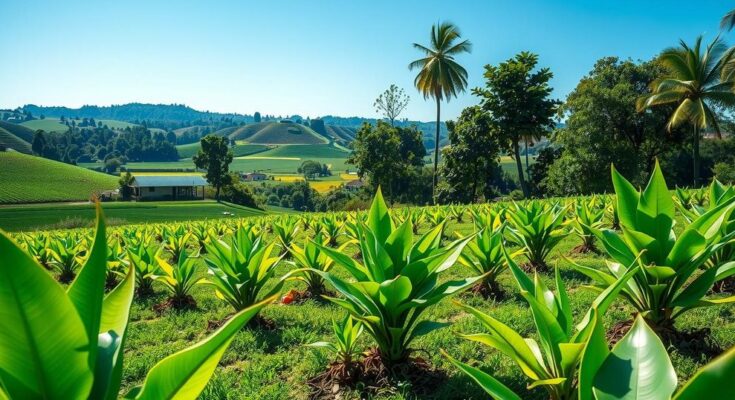Farmers in Madagascar’s Sava region face severe challenges due to climate change, affecting their ability to cultivate vanilla and other crops. A recent survey indicates that while most acknowledge these issues, only a small fraction are making necessary adaptations. Financial constraints significantly deter these farmers from adopting new practices, necessitating supportive policies. Further research is set to expand understanding and promote resilience among vulnerable farming communities.
Farmers in Madagascar’s Sava region, a key vanilla-producing area, are grappling with significant effects of climate change, as detailed in a recent study involving nearly 500 local farmers. Erratic weather patterns disrupt traditional agricultural practices, heightening the challenges these farmers face in maintaining their livelihoods. With about two-thirds of the world’s vanilla beans produced here, the implications of changing temperatures and rainfall are profound, affecting essential crops like rice and lychees, as well as farmers’ ability to sustain their families.
Field interviews conducted in 2023 revealed that most farmers are experiencing detrimental changes in the climate, negatively impacting their crop yields. While awareness of these changes is prevalent, only a minority of farmers are adopting new agricultural strategies to cope. Many farmers reported dwindling water supplies and increased susceptibility to pests and health issues, yet only about 20% have made any adjustments, such as using fertilizers or altering planting schedules, suggesting a gap in adaptive practices amidst acknowledged risks.
The study indicates that financial constraints significantly hinder the farmers’ ability to implement more resilient farming practices. With four-fifths of Madagascar’s population living below the poverty line, investments in labor and material for adaptations are often prohibitive. Researchers underscore the necessity of supportive programs to mitigate these costs for vulnerable farming communities.
Innovative approaches to farming, such as incorporating fruit trees and fish farming, may enhance food security and promote ecological balance. However, Madagascar’s farmers are beset by various risks, including cyclones, which regularly devastate crops and complicate market access. Reports also indicate a national trend of rising temperatures and diminishing rainfall, compounding the challenges faced by smallholder farmers who contribute to one-third of the global food supply.
Researchers are expanding their inquiry to 34 villages to validate their initial findings and assess the efficacy of farmers’ adaptive measures. The ongoing research will explore how climate change demands flexibility and resourcefulness in farming, a reality that magnifies the precariousness of food security for these families. The urgency for intervention through funding and policy support is emphasized to assist small-scale farmers in navigating these escalating challenges.
In summary, farmers in Madagascar are increasingly vulnerable to the adverse effects of climate change, contributing to significant agricultural challenges in a region critical to global vanilla production. While the awareness of these impacts is widespread, limited adoption of adaptive practices due to financial constraints presents an obstacle. Innovative farming methods and supportive policies could facilitate improved resilience among affected communities, highlighting an urgent need for intervention. Continued research will provide further insights into effective strategies for these small-scale farmers as they confront climate-related adversities.
Original Source: www.eurekalert.org




